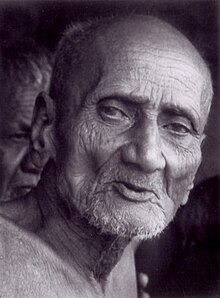Shantisagar
| Charitra Chakravartin Acharya Shri Shantisagar Ji Maharaj | |
|---|---|

Acharya Shantisagar
|
|
| Religion | Jainism |
| Sect | Digambara |
| Personal | |
| Born | Satgauda 1873 Yalgud, Karnataka |
| Died | 18 September 1955 (aged 82–83) |
| Cremation place | Kunthalgiri, Maharashtra |
| Parents |
|
| Religious career | |
| Successor | Virasagar |
| Initiated | Virasagar, Nemisagar |
| Initiation | 1919 Yarnal by Devendrakirti |
| Initiation | 1915 |
Acharya Shri Shantisagar (1872-1955) was an Indian Jain monk and the first Digambara Jain Acharya of the 20th century. He was an important leader in the Digambara sect of Jainism. He was also the first Digambara monk who, after several centuries of non-contact with the region, wandered in North India. He is credited with reviving interest in the traditional religious practices of the Digambara monks.
His lineage consists of contemporary Digambara Jain monks. His followers have pronounced him Charitra Chakravarti, which means Emperor of Character.
Shantisagar was born in either 1872 or 1873 in north Karnataka. His father either worked as a farmer or was employed in the clothing business. By the age of eighteen, having read religious texts and undergone several pilgrimages, Shantisagar decided to dedicate his life to a religious order.
After his parents died in 1912, he traveled to the Jain holy city of Shravanabelagola, where he was lustrated into a holy order in 1918. He took his religious vows (ailaka) before an image of the Tirthankara Neminatha, a famous Jain spiritual leader. His vows began his full initiation into Digambara, sect of Jainism, and he ultiamtely became a monk at the age of 47 or 48. In 1922, at the village of Yarnal, he was given the name Shanti Sagara, which means Ocean of Peace.
Shantisagar preached the principles of Jainism in various parts of the country and was given the title of Acharya due to his renowned spiritual knowledge and wisdom. His disciples also gave him the title of Charitra Chakravarti, which means Emperor of Good Character. Other titles he was given included muniraj, meaning King Among Ascetics, and silasindhu, meaning Ocean of Observances.
He went on a successful hunger strike to oppose the restrictions imposed on Digambara monks by the British Raj.
...
Wikipedia
